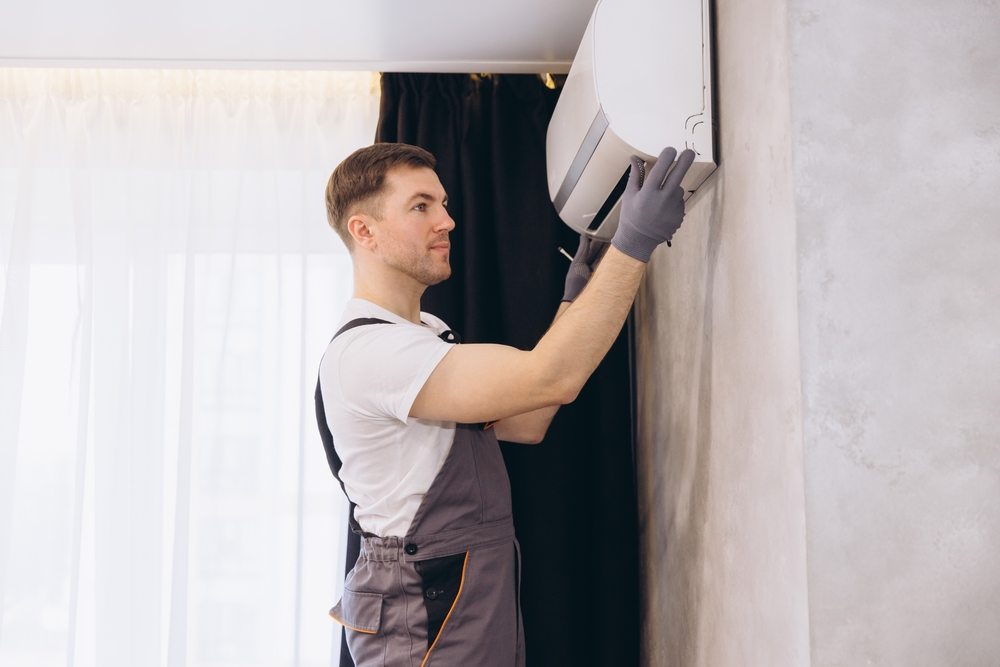
Living in an apartment means you rely on your landlord or property manager to keep your home safe and legal. But what if you, or someone you hire, tries to tackle a repair or upgrade without knowing the rules? A lot of the “quick fixes” people use can actually be illegal, putting your safety and your security deposit at risk. Building codes exist to protect residents from hazards like fires, electrical shocks, and structural failures. Ignoring them, even for what seems like a small project, can lead to fines, eviction, or even accidents. So, if you are planning on any improvements, take a moment to consideer these seven fixes and why it might be best not to DIY.
1. Installing an Unapproved Washer or Dryer
Many renters dream of having their own laundry machines, but installing a washer or dryer in your apartment can easily violate building codes. Most apartments are not wired or plumbed to handle the extra load. Plugging in a portable washing machine or ventless dryer without permission can overload circuits or cause water leaks. In some cases, you could even risk starting a fire or flooding your neighbor’s unit below. Always check with your landlord and local code enforcement before making any laundry upgrades to avoid problems with apartment fixes that violate building codes.
2. Blocking Fire Escapes and Windows
It might seem harmless to place a bookshelf or dresser in front of a window, but this can create a fire hazard. Building codes require clear egress routes in case of emergencies. Blocking windows, fire escapes, or hallways—even temporarily—can lead to hefty fines and endanger lives. This rule is strictly enforced in cities with older buildings and limited exits. If you need more storage, look for creative solutions that don’t obstruct any escape routes.
3. DIY Electrical Work
Swapping out a light fixture or adding a new outlet might look easy on YouTube, but doing electrical work without a licensed professional is illegal in most areas. Building codes exist to prevent overloaded circuits, shocks, and fires. Using the wrong wire gauge or failing to ground a fixture can have serious consequences. If you want new lighting, always hire a licensed electrician or ask your landlord to arrange the upgrade.
4. Removing or Altering Smoke Detectors
It’s tempting to take the batteries out of a chirping smoke detector, but tampering with fire safety equipment is a major violation. Building codes require working smoke detectors in every apartment, usually in bedrooms and hallways. Removing, disabling, or covering them—even temporarily—puts everyone at risk. If your detector is malfunctioning, contact your landlord right away. Never attempt to fix or replace it yourself, as the wrong model or placement can also violate the code.
5. Swapping Out Doors or Locks Without Approval
Security is important, but changing out your apartment’s front door or locks without permission is not only a lease violation—it may also break building codes. Fire-rated doors and approved lock sets are required for a reason: they slow the spread of fire and allow for emergency access. Installing a lock that can’t be opened from the inside without a key is especially dangerous and illegal in many places. If you’re worried about security, talk to your property manager about approved upgrades instead of making fixes that violate building codes.
6. Installing Portable Gas Appliances
Bringing in a portable gas heater or stove might seem like a way to save money or add convenience, but it’s a big code violation in most apartments. Portable gas units can leak, causing fires or carbon monoxide poisoning. Most leases and city codes strictly forbid these appliances because of the risks involved. If you need extra heat or cooking options, stick to electric appliances that are allowed by your building and always check the manufacturer’s guidelines.
7. Adding Permanent Walls or Partitions
Some renters want to create a home office or extra bedroom by building a wall or partition. But adding permanent structures without permits almost always violates building codes. Improperly built walls can block air flow, restrict exits, and even damage the building’s structure. Even temporary partitions can cause issues if they interfere with sprinklers or smoke detectors. Before you start any construction, consult with your landlord and check city regulations to avoid apartment fixes that violate building codes.
Staying Safe and Legal in Your Apartment
It’s tempting to customize your space, but making changes without understanding the rules can lead to trouble. Apartment fixes that violate building codes might seem minor, but they can have major consequences for your safety and your lease agreement. Always check your lease, talk to your landlord, and research local regulations before starting any project.
Have you ever run into trouble with apartment fixes that violate building codes? Share your stories or questions in the comments below!
What to Read Next…
- 6 Garage Uses That Can Violate City Code
- 7 Diy Home Repairs That Are Illegal In Some States But Most Dont Know It
- 9 Code Compliant Upgrades That Still Put You At Legal Risk
- 10 Simple Home Repairs That Can Become Lawsuits Overnight
- 7 Quiet Laws That Make Everyday Homeowners Criminals
The post 7 Apartment Fixes That Violate Building Codes appeared first on Clever Dude Personal Finance & Money.







